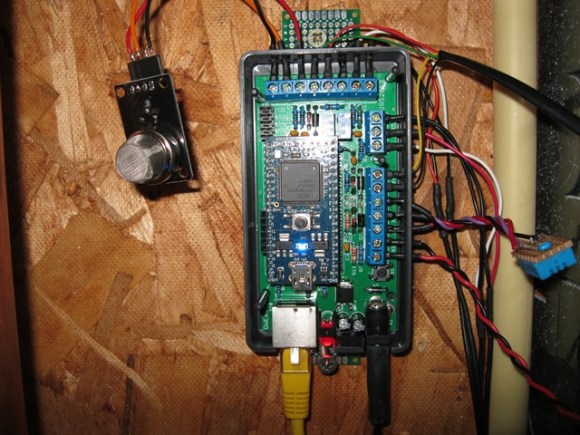
From the look of this you can tell that [Jasper Sikken] has some pretty interesting stuff going on to monitor the utilities in his home. But it’s important to note that this is a rental home. So adding sensors to the gas, water, and electric meters had to be done without making any type of permanent changes.
The module above is his own base PCB which accepts an mbed board to harvest and report on usage. His electric meter has an LED that will flash for every Watt hour that is used. He monitors that with a light dependent resistor, crafting a clever way to fasten it to the meter using four magnets. The water meter has a disc that makes one revolution for each liter of water that passes through it. Half of the disc is reflective so he uses a photoreflective sensor to keep track of that. And finally the gas meter has a reflective digit on one of the wheels. The sensor tracks each time this digit passes by, signifying 10 liters of gas used. He also monitors temperature which we’re sure comes in handy when trying to make sense of the data.
[Thanks Stephen]















Nice. I’d add a couple more current/power sensors so you can tell where that energy is going. Stove, fridge, AC, water heater. Those are the big ones, after than, it’s all “living expense” like lights and TV, can be lumped together. This would be a big help if you were looking for places to cut back.
Back in the 70’s, I heard of a way to get “free” electricity by putting magnets close to the meter. These would put additional drag on the turning aluminum disk and slow down the counter. If this was true, and you still have a turning-disk meter, the electric company might not like you putting magnets close to their meter.
Some modern meters actually detect magnetic currents and raise a fraud alert if the field is strong enough.
I think alot more powerful/useful from the electrical side is: http://openenergymonitor.org/emon/Modules Currently I am using it to monitor the legs on my generator for when the power goes out, make sure I am not overloading it
I don’t think any magnets are going to have any effect on slowing an aluminium disk.
Gas Water Heaters
take a look on http://metern.org